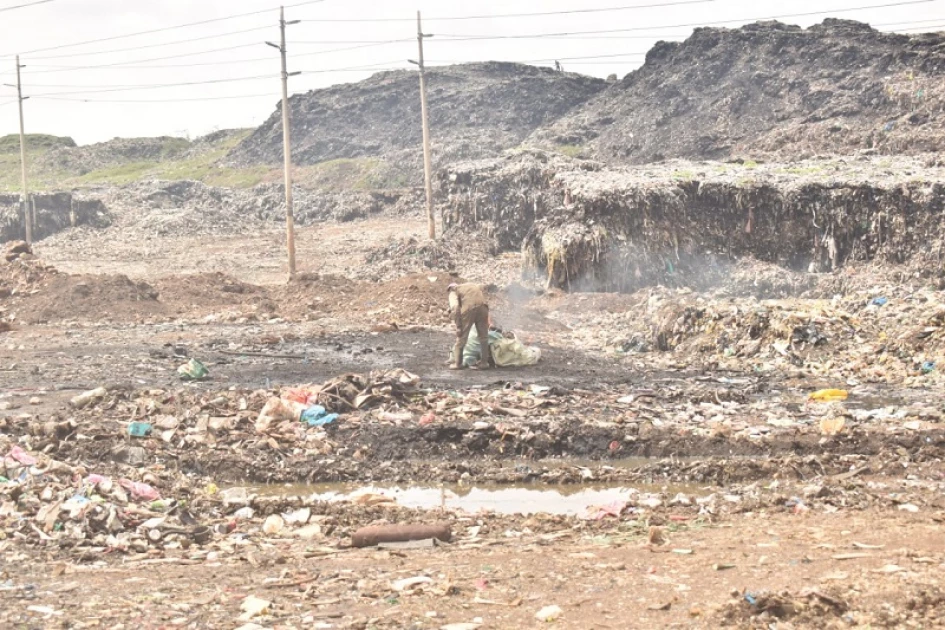Juliani’s Taka Bank Initiative transforming plastic pollution in Nairobi

Section of Nairobi's largest dumping site in Dandora. It's one of the Taka Bank's sources of plastic waste. [Photo / Zachary Mayieka]

Audio By Vocalize
Nairobi City has become one of the plastic hubs in Kenya,
where non-biodegradable litter is seen in many residential areas.
Plastic waste is one of the pollutants in the city despite the ban on single plastic use in the country. Plastic was banned in 2017, a move that was lauded as ground breaking.
Plastic pollution became a problem because it was affordable, durable and pervades modern life, appearing in everything from packaging to clothes to beauty products.
Data from the United Nations Environment Programme, UNEP, indicate that more than 280 million tonnes of short-lived plastic products become waste. Data shows that 46 per cent of plastic waste is landfilled, while 22 per cent is mismanaged and becomes litter.
Unlike other materials, plastic does not biodegrade. It can take up to 1,000 years to break down. When discarded it builds up in the environment causing pollution that chokes marine, wildlife, soil, poisons ground water and causing serious health risks.
Dandora is one of the informal settlement areas in Nairobi which has been used a dumping site for many years. The area has been polluted and strong stench smell can be smelt from a distance. This is the largest dumping site in Nairobi.
A group associated with Juliani, Kenyan rapper, is driving an initiative called Taka Bank that is recycling slum waste. The group has partnered with kiosks (Taka bank kiosks) which serve as collection stations for waste in Dandora.
Each kiosk is manned by a number of youths who sort out the waste into papers, glass, tins and plastics and sell them to recycling companies. Most of these youth are former scavengers at Dandora dumping site.
The group's Nairobi County coordinator Solomon Njoroge says that there is a high level of stigma associated with waste pickers as they are presumed to be dirty.
‘‘We are trying to make the public understand that picking waste is a job just like any other," he said.
Households in Dandora take their waste to the kiosks where it is weighed and awarded tokens which are redeemable and can be used to purchase other commodities from the kiosks. For instance, if one has 300 tokens, they can redeem to get maize flour that translates to one dollar (Kshs.150).
"We are collecting and sorting branded waste with a mission of reaching out to production companies since they are responsible for their waste disposal,’’ says John Kinyanjui, the group’s organizing secretary.
He adds that: ‘‘But you know we need a huge amount for us to reach them. That is why we are accumulating them and storing the waste."
Benard Michael, alias Baba Michael who owns one of the Taka Bank's kiosks says the initiative has not only guaranteed a clean environment but also has increased sales in his kiosk using tokens from waste.
Mary Mwangi, a resident in Dandora who collects waste and takes to Taka bank says she started depositing waste to Taka Bank last year because of the tokens programme.
‘‘I use them to purchase my house commodities like maize flour, sugar, soap and even cooking oil,’’ she says while smiling.
The residents can use the tokens as well to pay rent, school fees and other needs courtesy of Taka bank.
Peter Ajulu who works with Mr. Green Africa Initiative says their initiative provides a platform where people especially motorists dispose plastic waste in a garbage protection container and earn some redeemable tokens as fuel, airtime or cash money.
"The benefit of this initiative is that the plastics do not get to the unrecoverable state. They don't get to dumping sites, rivers or oceans and they are clean for recycling," said Ajulu.
Mr. Green Africa is a trailblazing recycling company that uses plastic waste to manufacture other useful products in a bid to end plastic pollution.
The rapidly increasing levels of plastic pollution represent a serious global environment issue that negatively impacts the environmental, social, economic and health dimensions of sustainable development.
Under a normal scenario and in the absence of necessary interventions, the amount of plastic waste entering aquatic ecosystem could nearly triple from 9 to 14 million tonnes per year in 2016 to a projected 23 to 37 million per year by 2040. This is according to the United Nations.
However, initiatives like Taka Bank and Mr. Green Africa Initiative could help reduce plastic pollution.
This comes as the world representatives converged in Nairobi from 13th-19th November 2023, for Intergovernmental Negotiating Committee, Third Session (INC- 3) to develop a global treaty to end plastic pollution.
According to WWF, since negotiations kicked off in November 2022, it is estimated that more than 11 million tonnes of plastic has leaked into the ocean.
WWF's latest report says low-income countries, under current methods and structures, incur a lifetime cost of plastic, 10 times more than rich countries.


Leave a Comment